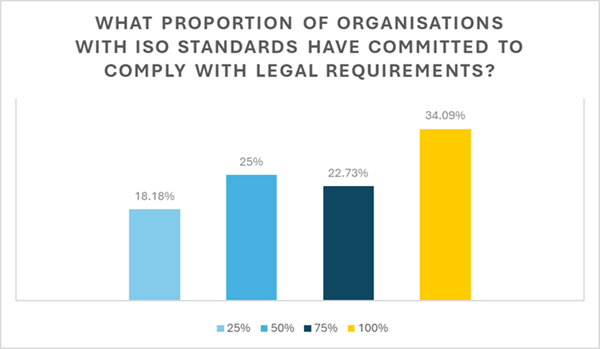From Misconceptions to Mastery: Understanding ISO Compliance Obligations
10 December 2024
Explore the key takeaways from the surveys conducted during our recent webinar with ISO Compliance Register.
_1.jpg?width=680&height=465)
Complying with ISO Standards can be a confusing and complicated topic. Not every organisation with ISO Standards has the luxury of a dedicated manager, which can make navigating the topic even more daunting.
However, using the framework that an ISO management system provides can add excellent value to any business. This value is what drives us, inspiring our webinar, for which we partnered with ISO Compliance Register, back in September.
The webinar included an introduction to the topic of Legal and Compliance Obligations for ISO Standards, which are sometimes referred to as ‘Legal and Other Requirements’. We also provided guidance on the processes needed to achieve your ISO Compliance goals.
In this blog, we will run through some of the questions we asked attendees during the webinar, as well as their responses given via polls.

Do all ISO standards require a commitment to comply with the law?
The first of the polls during the webinar asked attendees about legal requirement commitments:“What proportion of organisations with ISO Standards have committed to comply with Legal requirements?”
Surprisingly, only 34% of people answered that all ISO Standards need to have a commitment to comply with Compliance Obligations.

This highlights a potentially common misconception around ISO Standards, the misconception being that ISO Standards have no reference to the legal basis on which to run a business.
However, all organisations that are looking to improve should do so on the basis that they are operating in a legal way.
All ISO Management Standards require that the top management commit to comply with Compliance Obligations. This can be seen in the four main standards ISO 9001 (for Quality), ISO 27001 (Information Security), ISO 14001 (Environmental) and ISO 45001 (Occupational Health and Safety). These standards all include clauses that say the standards require a stated commitment to legal and other requirements.
The experts from ISO Compliance Register pointed out that it is vital for businesses to understand the legal obligations that come with ISO Standards, and the commitment to compliance they have as a result.
Organisations should therefore ensure that their top-level policies all demonstrate this commitment, and managers that are signing off on policies are aware of the commitments that they are making.

What are the benefits of knowing compliance obligations?
In the second question, we also asked about the benefits of knowing Compliance Obligations. We then asked what benefits would be most helpful for businesses. Here is what the attendees of the webinar said:
Customer satisfaction
Over half of the attendees included customer satisfaction in their list of most important benefits. Compliance Obligations are a great way of showing your customers that you are a reliable and responsible business with their best interests at heart. They have a positive effect on the way in which your business is perceived, making it a valuable resource for customer satisfaction.
Avoiding litigation
Around 45% of attendees named avoiding litigation as one of the most helpful benefits. Knowing Compliance Obligations can help avoid litigation and the expenses that come with it.
Understanding tasks
Another benefit voted as helpful is understanding the tasks associated with Compliance Obligations. These tasks are directly applicable to your business and make compliance easier by simplifying the process.
Staff knowledge
Staff knowledge of compliance obligations was also voted as highly important, something that a good compliance register can provide. It acts as a source of information that can be easily shared with whoever needs it across the business.
All these benefits demonstrate the value that good understanding of compliance obligations can bring to your business.

How many new and updated items of legislation are there?
In our third and final question to our ISO Compliance Register Webinar attendees, we asked whether they could guess how many legal updates there are every year.The surprising result was that most attendees greatly underestimated how many there were!

From the beginning of 2024 to the date of the ebinar in September, there were over 300 items of new and amended compliance obligations which could be relevant to ISO Management Systems.
The result of the poll showed that most people estimated the number to be between 50 and 100. The underestimation of legal updates showcases one of the main struggles in ensuring legal compliance. The large number of updates makes it very difficult to keep up with all of them, leading to potentially important updates being missed. The result asserts the need for an effective system to stay up to date for you.
An ISO Compliance Register can help you cut through the noise around the huge number of updates, so you get the information you need. The ISO Compliance tool has been built around condensing the updates into information applicable and useful for your business. This is one of the easiest ways to achieve your ISO Compliance goals, saving you time by simplifying the process.

A few final words on legal and compliance obligations
At NQA, we believe that every business can do better, consistently, continually and sustainably, and it’s what we’re here to help achieve. We know that achieving ISO compliance is not just about ticking boxes, it’s about integrating compliance into your business processes to drive continual improvement.Legal and compliance obligations are a fundamental part of this approach, ensuring businesses operate within legal frameworks while also meeting self-imposed or industry-specific standards. By incorporating these obligations into everyday operations, organisations not only demonstrate their commitment to excellence but also proactively mitigate risks such as non-compliance or litigation.
NQA provides accredited certification, training and other support tools and services to help you improve processes, performance, products and services.

![]()
Discover how to get started with this certification by speaking to a friendly sales team member today!

